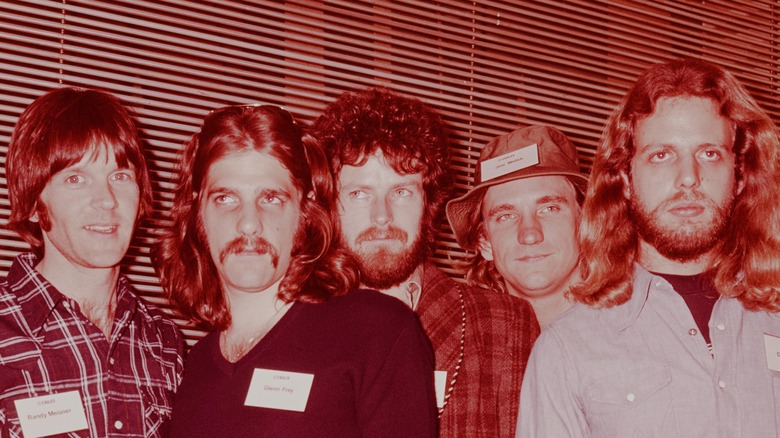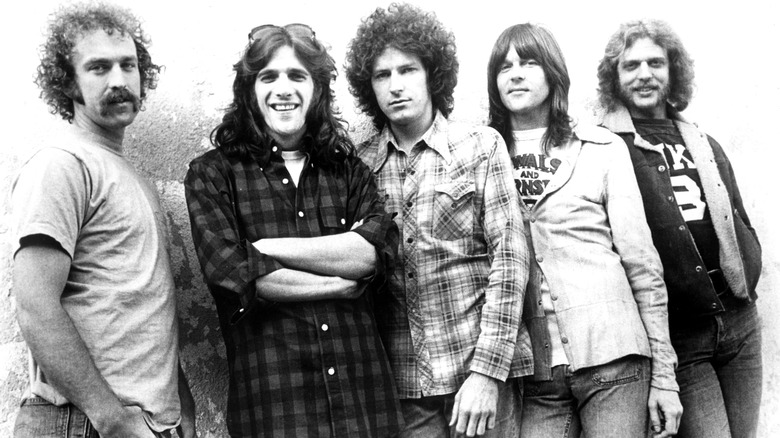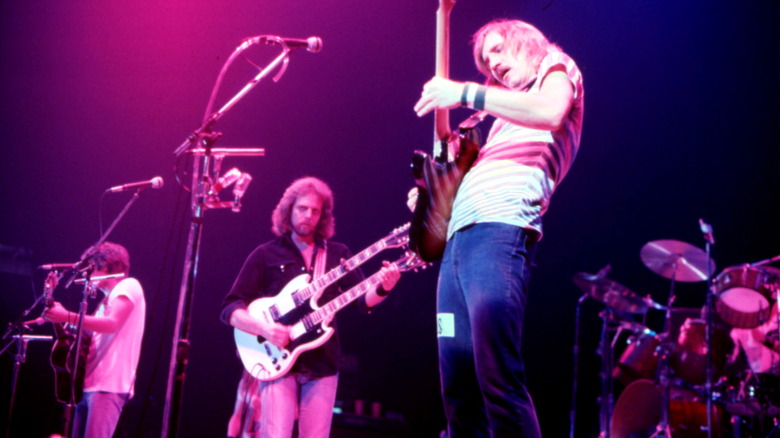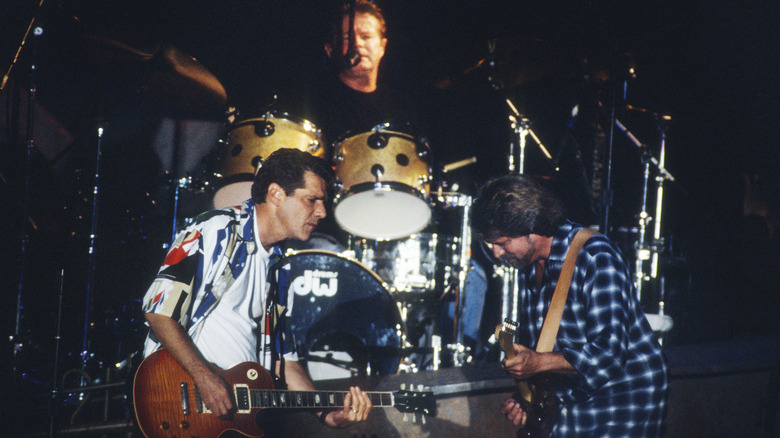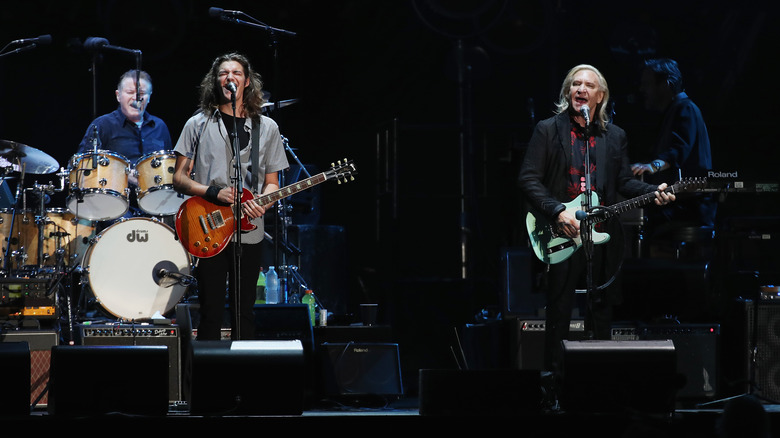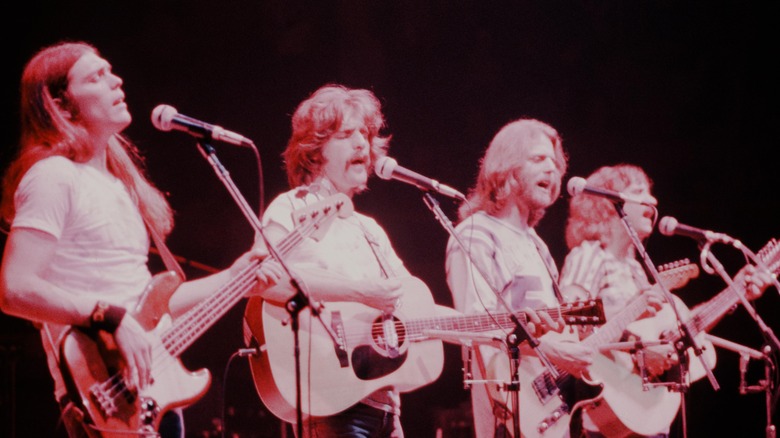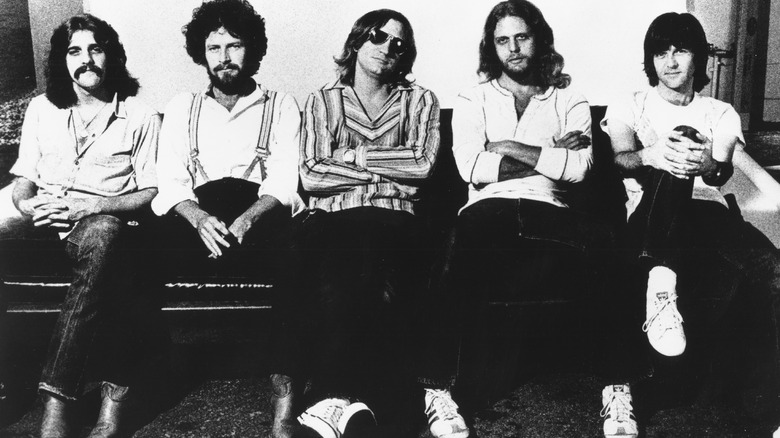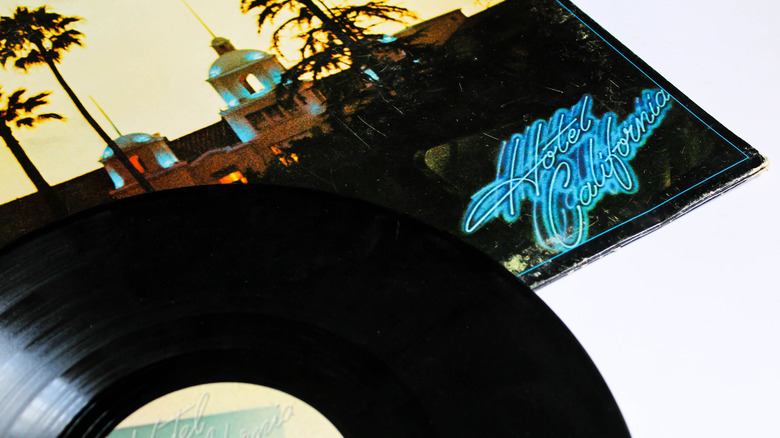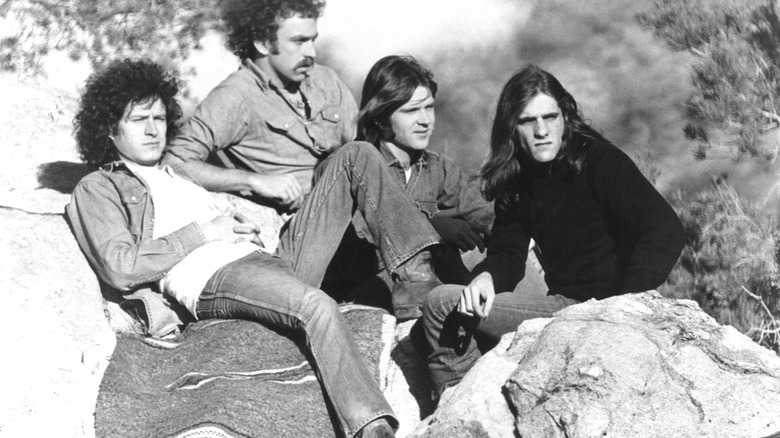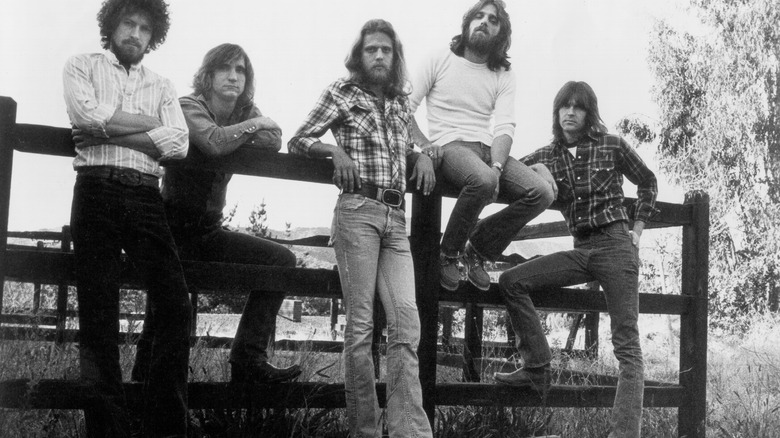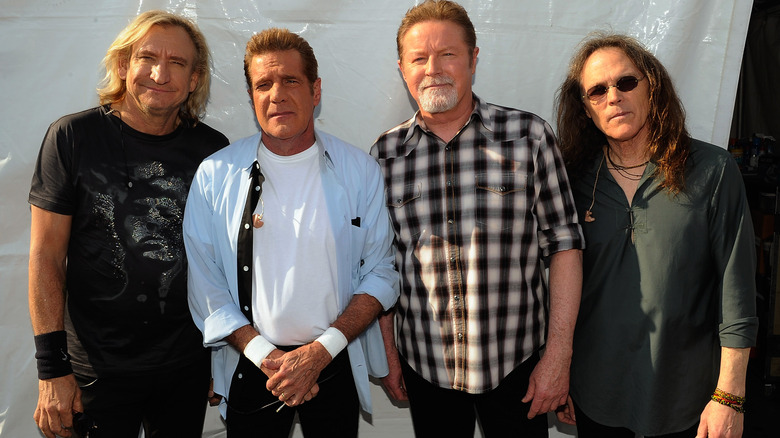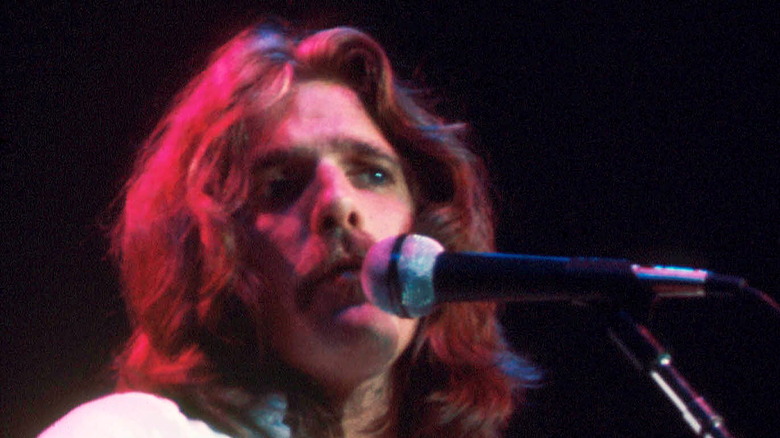The Tragic Real-Life Story Of The Eagles
The Eagles might be a bit of a punchline – as quoted in the movie "The Big Lebowski," "I had a rough night and I hate The Eagles, man!" — but there's no denying the fact that they're one of the biggest bands in American music history. Their songs are iconic: "Hotel California," "Take It Easy," "Witchy Woman," and the list just keeps going and going.
The Eagles might be behind some of the best albums to put on if you just want to chill out, but behind the scenes, it was anything but chill. Don Henley knew even when they were working on their first album, that the band was going to encounter rough waters, according to Rolling Stone.
That would turn out to be a massive understatement, and The Eagles ended up having one of the most tumultuous runs of any band of the era ... or before, or since. From fighting on stage to fighting in court to rampant drug use, and tragic, untimely deaths, The Eagles have seen several lifetimes' worth of hard times.
The band was doomed from the start
In 2018, Variety reported that The Eagles' "Greatest Hits 1971-1975" album finally knocked the longtime, best-selling album Michael Jackson's "Thriller" off the top.
That's impressive, but what's even more impressive is that it meant The Eagles hold two of the top three spots when it comes to most albums sold: "Hotel California" holds the No. 2 spot. If the band had been able to get out of its own way, who knows what other music they might have released.
Way back in 1979, Rolling Stone spent a serious amount of time with the band, and life on the road was already taking a toll on them. Don Henley, for starters, was suffering from severe back pain, along with an ulcer he'd developed before his 30th birthday.
The Eagles are famous for their fighting, and it turns out they never really had a chance. After the original lineup formed, it was just after their third rehearsal that Henley informed Glenn Frey: "You and me are going to have to run things." Where did that leave Bernie Leadon and Randy Meisner? They were told to follow along but couldn't manage to get on the same page long enough to stand up to Henley and Frey, which made everyone miserable from day one.
One on-stage explosion ended it all
The Eagles' first album came out in 1972, and it was Don Henley who told Rolling Stone that there were some serious tensions and moments of magical inspiration — including some that were fueled by mescaline.
"Hotel California" followed in 1976, and even though they were riding high (no pun intended), Taste of Country says that the pressure was just too much. Smoldering anger and resentment exploded into fireworks on July 31, 1980. The Eagles were performing at a fundraising concert for Senator Alan Cranston. When Cranston met and thanked everyone ahead of the show, Don Felder would respond: "You're welcome, Senator ... I guess."
That, at least, was what Glenn Frey always maintained that he heard. The group took the stage, but amid the performance were a series of threats and promises to make good on those threats. As reported in Taste of Country, Frey explained: "So now we're onstage, and Felder looks back at me and says, 'Only three more songs till I kick your a**, pal.' And I'm saying, 'Great, I can't wait.' ... That was when I knew I had to get out." The entire thing climaxed with some smashed guitars and everyone in the band calling it quits.
Joe Walsh experienced loss at an early age
Joe Walsh joined the already-successful group in 1975, per Ultimate Classic Rock, and even though he was already successful as a solo artist in his own right, life hadn't always been easy. In 2017, he looked back over his career with Rolling Stone, and one of the first things mentioned in the article was his new charity, VetsAid. He explained why he was so dedicated to raising money for the country's military veterans and why he always visited Walter Reed Hospital when he could.
"My dad died when I was a year and a half old. He was in the Army Air Force, so I've always just been sympathetic to vets. My buddies went to Vietnam and came back a mess ... I don't see the vets getting the attention they deserve," Walsh told Rolling Stone.
Fast forward a bit, and People interviewed Walsh ahead of the 3rd annual VetsAid charity concert. He talked more about the loss, saying his father had been serving on active duty when he was killed. Walsh is particularly involved with the children of Gold Star families — those who have lost a family member to military action. The families have their own place to go during one of Walsh's concerts, where they can meet others struggling with the same thing. "That's something I never had, so I'm grateful to make that possible for them," Walsh said.
Losing his father changed Don Henley's life forever
When Rolling Stone asked Don Henley about how long he had known just how unfair the world was, it was an easy answer. Henley's father had — like so many others of his generation — quit school when he was in eighth grade and spent his adulthood making a better life for his son. He died just after The Eagles released their first few songs: "Take It Easy" hit the radio, then "Witchy Woman," and then Henley was in the hospital watching his father pass away from one of a series of heart attacks.
"I figured out a long time ago, when my father got sick and died, that life wasn't fair ... You don't know what's real until you see your father in the emergency room heaving and gasping for breath and saying, 'Oh God! Oh God!' Everything gets real trite after that," Henley told Rolling Stone.
Henley said that his father's death destroyed his view of what the world was really like, and at the time of the interview, he had a single close living relative: his mother. He added that he never forgot his friends from Texas that had tried to make it in the industry and died along the way, saying he also felt guilt about them.
Why Felder feuded with Henley and Frey
In 2013, The Hollywood Reporter revealed that former Eagles guitarist Don Felder had a net worth of around $60 million. Not too bad, right? He disagreed: He had been fired from the group in 2001, and that departure was followed by a $50 million lawsuit for — among other things — breach of contract and wrongful termination. Don Henley and Glenn Frey responded with a lawsuit to stop Felder from publishing his memoir, and even though it was settled out of court, things got ugly. So, what happened?
Felder versus Henley and Frey was on Rolling Stone's list of biggest music industry feuds, and they say it all culminated when the rest of the band refused to let Felder sing "Victim of Love," which he had written. Felder did the original vocals, then everyone else went behind his back to wipe all copies and re-record the song. Ouch.
Things just got worse and worse, leading up to that very public, on-stage, and on-mic meltdown in 1980. When The Eagles reunited in 1994, things went sideways very quickly when Felder accused Henley and Frey of keeping a higher percentage of the profits, which led to Felder being fired. They never reconciled.
Joe Walsh lost his daughter in a tragic accident
Joe Walsh was on the cusp of joining The Eagles when he decided to put out what he described as a more serious sort of album, according to Ultimate Classic Rock. That was "So What," and the entire thing ended up rooted in Walsh's confrontation with a parent's worst nightmare.
His "Song for Emma" is a reference to his daughter. He summed up the story for Rolling Stone, saying that he and his then-wife, Stefany Rhodes, had been living in Boulder, Colorado. His wife was driving through town with their daughter in the car when, as Walsh retells, "... some lady ran a stop sign and creamed our car. And I lost my daughter. And it was gory and all that. To help with closure, I wrote this song for her."
In 2010, the Daily Camera talked to Rhodes about the memorial water fountain that was installed in the North Boulder Park playground. The fountain, she said, had been his idea and was a way to memorialize the favorite park of the mother-and-daughter duo. Walsh and Rhodes divorced, and Walsh would later say that the name of his next album — "So What" — came from the attitude he had towards the world after his daughter's death.
There was a shocking incident in 1979...
In 2017, Joe Walsh got candid with Rolling Stone and confirmed that there were plenty of times when he looked back and saw himself being swept away from the actual music by the lifestyle. It wasn't always harmless fun.
In 2015, Don Henley did an interview with The Guardian where he looked back on his career, but one of the things they say they definitely didn't ask him about was a specific instance in 1979 that involved drugs, an arrest, and an underage girl.
Finding anything about the incident is a little difficult, but the news story was saved through UPI. In 1981, Henley finally had his day in court, where he pleaded no contest to contributing to the delinquency of a minor. The offense was a misdemeanor and got him a $2,500 fine, two years on probation, and in order to avoid felony drug charges, he was also ordered to complete a program on the dangers of narcotics.
Henley's arrest came after paramedics were called to his home to help someone suffering from a drug overdose. When they got there, they reportedly found a 16-year-old girl; later, police seized a hefty haul of cocaine and Quaaludes.
The Eagles' 'writing tool' brought out the worst in everyone
According to Far Out, Don Henley often said the band had a "writing tool" helping them work. That was cocaine, and their habit was way worse than anyone might imagine.
When Rolling Stone did a retrospective on "Hotel California," The Eagles shared the fact that their sessions were often interrupted by Black Sabbath, who was recording in the studio next to them. At one point, Sabbath headed into the studio after The Eagles had used it, and Geezer Butler, the bassist for Sabbath, said, "Before we could start recording, we had to scrape all the cocaine out of the mixing board."
Hindsight, they say, is 20/20, and several of The Eagles have expressed their regret at going so far down the rabbit hole of narcotics. "Life in the Fast Lane" is famously about the kind of lifestyle they were living, and Henley later said that while they were recording, he couldn't even listen. "I was getting high a lot at the time, and the song made me ill. We were trying to paint a picture that cocaine wasn't that great. It turns on you."
The song was, in fact, inspired by a specific incident where Glenn Frey and his dealer were flying down the road in a Corvette, going somewhere around 90 mph. Unfortunately, it wasn't just a song, it was a reminder of just what it was they were doing to themselves.
Cocaine probably torpedoed a Hotel California movie
Some songs are great for background music, while others tell a story that plays out in the mind of anyone who hears it. "Hotel California" is definitely one of those songs, and how cool would it have been to see a movie based on the song? It almost happened, and it was going to be done by the same producer who was behind "The Sting," "Close Encounters of the Third Kind," and "Taxi Driver," per Ultimate Classic Rock.
Julia Phillips was a powerhouse in Hollywood. She wrote in her 1991 memoir that when "Hotel California" came out, she wanted to sign The Eagles on to create a movie that would "incorporate the musical talent with the writing talent at the very beginning."
There are two sides to what happened. According to Phillips, she served up a plate of cocaine during their first meeting, and absolutely everyone dug in like it was part of their job. Then, she said they were all going to think about it.
Don Henley, on the other hand, claimed they were worried the songs would be ruined and had all declined the offer of cocaine because it was a business meeting after all and they had only recently met Phillips. What really derailed talks of a "Hotel California" movie? At this point, it's impossible to say.
Randy Meisner left during a massive fight
Anxiety, says Healthline, is a biological response to highly stressful situations. Randy Meisner quit over The Eagles' relentless pushing to get him to do the thing that kicked his anxiety into high gear: singing "Take It to the Limit."
According to "The History of the Eagles" documentary (via Taste of Country), it became such a big deal at all of their live shows that he started to have serious issues with anxiety, and he would later tell Rolling Stone, "I was always kind of shy. They wanted me to stand in the middle of the stage to sing 'Take It to the Limit,' but I liked to be out of the spotlight."
Things came to a head at a show in Knoxville, Tennessee. Meisner was suffering from the flu and a flare-up of his ulcer, and after going through not only the concert but several encores, he says it was Glenn Frey who told him to get back out on stage for the song he dreaded.
Frey didn't take no for an answer, and Meisner took a swing at him. That turned into a fight that concert security needed to break up, but the damage had been done. "Those last days on the road were the worst," Meisner said. "Nobody was talking to me ... I was made an outcast of the band I'd helped start."
Randy Meisner's wife died in a tragic accident
In March of 2016, CBS News reported on a series of tragic accidents surrounding ex-bassist for The Eagles Randy Meisner. It started, they say, when police responded to a domestic violence call at around 5:30 p.m. When police arrived they expected to find a male suspect under the influence of drugs or alcohol.
They took a report, left, and at 7 p.m., they were back after a report of gunfire. Lana Meisner was pronounced dead just moments after police arrived.
CBS shared reports from TMZ that suggested there had been a lot of conflict in the Meisner household. Along with accusations that Lana was enabling Randy's substance abuse were documents filed by a family friend, who petitioned for conservatorship of Randy's three children. NBC News also reported that Meisner had, at the time, been given court-mandated supervision the previous summer after he had allegedly threatened to commit a murder-suicide.
All that aside, it was ultimately determined that Lana's death was an accident. Investigations found that she had been moving a rifle when another item in the case with the rifle shifted and caused the gun to fire.
They have a lot of regrets over the lifestyle they lived
According to The Telegraph, Glenn Fry once described The Eagles like this: "[We] got crazy, got drunk, got high, had girls, played music, and made money."
It was in 2007 that Don Henley looked back over that time period and said, "A lot of time was wasted doing things of little or no value," and what's more tragic than looking back on life and realizing how much of it was wasted? He fully admitted to The Guardian in 2015, "We were doing way too many drugs ... We should have taken a year off, or hired a band psychiatrist. Or both."
Joe Walsh's 2017 retrospective in Rolling Stone was just as full of regrets. While he said that the best part of their success was not having to worry about the basics anymore, 23 years of sobriety had made him realize, "It took me away from working at my craft."
Far from the one-time party animal he was, Walsh became a devout practitioner of meditation and believed that yes, there is a God — because, he mused, how else would he have survived? When they asked him about his regrets, he said that while his life's mantra of staying in the moment kept most of the sadness away, he does wish he could get four or five years of his life back.
The death of Glenn Frey led to a negligence lawsuit
Glenn Frey was just 67 years old when he died in 2016, and according to BBC, the official cause was complications from pneumonia, colitis, and rheumatoid arthritis. Not everyone agreed.
Longtime Eagles manager Irving Azoff spoke with The Wrap a month after Frey's untimely death and said that the pneumonia and the colitis had been caused by the prescriptions Frey had been given to manage his arthritis. Azoff declined to say anything further on the advice of his attorney, so it didn't come as a complete surprise when, in 2018, NBC News reported that Frey's wife, Cindy, had filed a wrongful death suit against the hospital. It claimed doctors and the hospital hadn't treated his illnesses and that Frey had been made "permanently injured and disabled until the time of his death."
None of that would, of course, bring him back or mend broken fences. Don Henley released a statement that indicated that he, at least, was letting bygones be bygones. He said, "He was like a brother to me; we were family, and like most families, there was some dysfunction. But, the bond we forged 45 years ago was never broken..."
